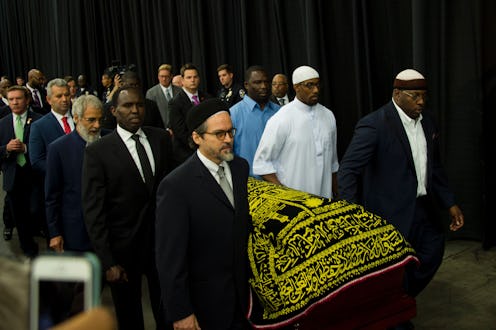News
Muhammad Ali's Funeral Honors Islam
Muhammad Ali was much more than just a champion boxer — he was "the people's champion" outside of the ring too. The 14,000 people who have turned up to his funeral in Louisville, Kentucky, Thursday, are a testament to that fact. One of the issues that the beloved boxer championed most was acceptance of his religion: Islam. When Ali first converted to the faith in the '60s he met a huge backlash. Ever since, he has been one of the most influential voices against Islamophobia. These photos from Muhammad Ali's funeral honor not just Islam but his role in introducing the faith to mainstream America.
He and his family have been planning the service for about 10 years. Ali himself said that it was important the service be carried out in Muslim traditions. A family spokesperson, Bob Gunnel, explained how the planning meeting began. "This began with 'The Champ' a decade ago. As he convened the meeting, he said, 'This is what I would like to see, this is the type of program that I would like to see, that is inclusive of everyone, where we give as many people an opportunity that want to pay their respects to me,'" Gunnel told gathered reporters.
The services honoring Ali are a multiple-day event, but Thursday's jenazah, a program of prayer, pays the biggest homage to Islam. The speaker scholar Sherman Jackson stood with the casket, which was covered in a black cloth covered in gold Arabic script. He faced the congregation, which was in rows facing Mecca. Jackson addressed Ali's role in mainstreaming Islam in the United States:
Ali made being a Muslim cool. Ali made being a Muslim dignified. Ali made being a Muslim relevant. Ali put the question of whether a person can be a Muslim AND an American to rest.
Ali, born Cassius Clay, Jr., converted to the Nation of Islam in the 1960s, meeting with Malcom X after key matches. White Americans were shocked and angry. A prominent sportswriter accused him of turning boxing “into a mass instrument of hate.” Ali wouldn't have any of that. He told a reporter, "Followers of Allah are the sweetest people in the world. They don't tote weapons. They pray five times a day."
Then in the '70s, Ali converted to Sunni Islam, the sect of the faith followed by 85 percent of Muslims nationwide. He then moved on to Sufism, a mystical version of the faith that encourages followers to have a close, individual relationship with God.
That has not kept him from speaking out about the faith in recent years. After Donald Trump proposed his Muslim ban during the primaries, Ali defended his religion. He said, "We as Muslims have to stand up against those who use Islam to advance their own personal agenda. They have alienated many from learning about Islam."
His role was not lost on the many Muslims in attendance Thursday — nor on American Muslim leaders. "“In a political climate in which Islamophobia is front and center, his funeral will be counterpunch the ridiculous notion that being a good Muslim and a good American are at odds," Dawud Walid, the Executive Director of the Michigan chapter of the Council on American-Islamic Relations said.
Given the political reality that Donald Trump has introduced, America needs Ali's leadership on Islam more than ever. Thanks to his careful planning of his funeral, they have it — even after his death.
